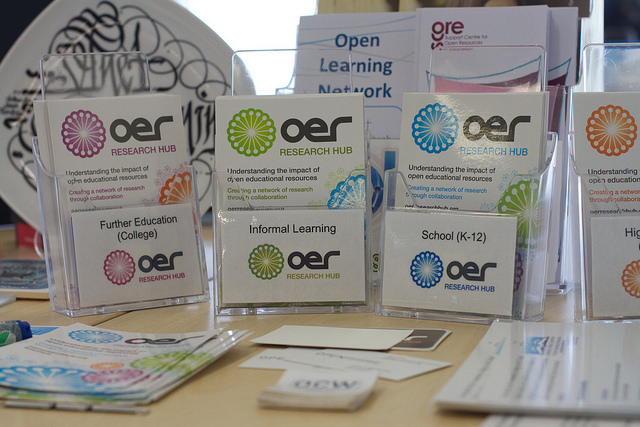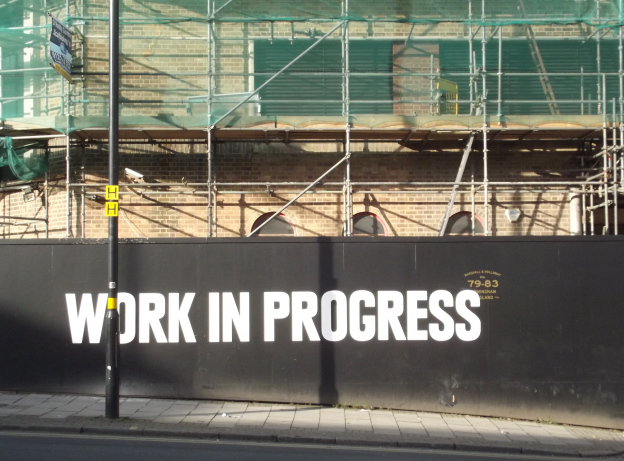 In some ways I have been a silent partner within the OER Research Hub team. They have asked me on many occasions to contribute to this blog and share the experience of constructing and managing an open education research project. The researchers within the team are undertaking their research in the open, so it would be amiss of me not to be open too. After all, I do think there are interesting things that would be of value to the community.
In some ways I have been a silent partner within the OER Research Hub team. They have asked me on many occasions to contribute to this blog and share the experience of constructing and managing an open education research project. The researchers within the team are undertaking their research in the open, so it would be amiss of me not to be open too. After all, I do think there are interesting things that would be of value to the community.
I have worked at the Open University for nearly 20 years. During that time I have done many different roles, all of them have been within a project management capacity of one sort or another, even though when I first started neither I nor the university knew that is what it was.
There’s a reason I like working with academics within a research project environment. It took me a while to work out precisely what it was that made the connection so strong, but fundamentally it was this. Under this processed project management exterior I am a creative person, I graduated from the Royal College of Art in 1992 having done a postgraduate degree in ceramics and glass. I feel there is an affinity between the creative process and scientific enquiry process.
The scientific enquiry method makes the assumption that everything in the universe is linked by cause and reaction; the creative process, as I see it, is similar in so much that you are trying to find the cause to give a particular reaction. So in research and creativity you start by making assumptions or having a vision about what you expect to find. I’m not going to dwell on this but I do think it’s an important connection and one I think plays out even more vividly within open research.
It’s been more than 12 years since I first did a formal project management qualification. For me there’s something particularly appealing about using a process, and this was particularly evident in the work I did as an artist. Using ceramics and glass is all about process. There’s a sequence to the development and completion of anything using those two mediums. Maybe it’s also something to do with being dyslexic, but for me there is a lot of reassurance within a process.
The Open University has its own project management methodology, (OUPM), one that I helped develop. The implementation of any methodology was a very slow and drawn-out affair. When I first had a meeting with senior members of staff involved in the production and presentation of the Open University’s courses in approximately 2003 to bestow the virtues of project management methodologies, the reception I received was less than enthusiastic, and I was sent away with my tail between my legs. Right thing at the wrong time is what I put it down to; after all there is nothing wrong with being ahead of your time.
But slowly over the next decade the University has developed a programme project management approach to the delivery of all of its strategic projects. There’s been a recognition of formal project management qualifications and the embedding of the methodology across large swathes of the University’s business.
On one level I would say that’s a good thing, but there’s a level of sophistication that needs to be applied to the successful application of project management principles, particularly within an academic research environment. Within the Institute of Educational Technology we’ve been applying those principles with success for a number of years. The term that I always seem to come back to when describing how we have made this possible is ‘making the methodology palatable’. There is no point in being a slave to a methodology if you can’t implement it within the environment you’re working. Far better to work with that environment to make it successful; sure there’ll be some challenges ahead but if you want to be a project manager of any note, you’ll want those challenges.
I’ve helped develop numerous research projects working with academics to construct proposals, initiate, control and ultimately successfully deliver them. There have been numerous funders, all with their own imposed restrictions, all of which have required the application of some project management principles. There doesn’t seem to be that much written about the application of project management within a research environment, there seems to be even less written about project management process application within an Open Research environment.
I’ve worked on three significant OER projects, OLNET, Bridge to Success and now OER Research Hub. So what challenges are there for a project manager, managing an open project? The team has a number of specific challenges that they have had to wrestle with, which in turn I have needed to accommodate or make allowances for.
- All their research is being done in the open
- They have a distributed collaboration model to help them find their evidence
- The project, as set by Hewlett, has a Global research remit
- All their research needs to harmonise towards one overall view of OER impact
- They have dual objectives: to find the evidence to prove their hypothesis but also to support and equip the community to undertake research into OER.
Really out of that little bulleted list, the first one is the one that we’re interested in, the ‘doing things in the open’ bit.
Any academic research involves a series of steps and activities (Mustaro & Rossi, 2013): there’s a certain level of planning involved and outlining what you expect to achieve, there are research activities that need to be undertaken, data to be collected and reviewed, and eventually findings that need to be communicated.
Within this research project there’s also the notion of ‘guerrilla research’ (Weller, 2015). Now I’m not saying that the OER Research hub are undertaking their research in this fashion but they are complementing their research in this way.
What I’ve concluded about working or delivering on any research project is that you need a broad structure to operate within and most of those activities can be fitted into traditional project management methods (PRINCE2, 2009). All the fundamentals need to be in place: an appropriate structure and governance process; roles and responsibilities; resource plan; delivery plan; stakeholder engagement /comms plan; impact plan; work package descriptions etc.
The aspect of ‘open’, simply put, means I have a set of activities that need to be planned for, it’s just a different set of restraints and requirements that we have imposed upon the project environment. For example, the aspect of open imposed upon the communications plan requires us to almost expose all the inner workings of the project out to the community. Which in reality means we must communicate frequently through all the relevant and appropriate social media channels, not just about output but also about process, methods, findings and thinking.
Yes, you need to understand why you should or want to do things in that way, but after you’ve grasped that concept from a project management point of view, it’s about making sure the activity is happening, that it’s happening in the right way, to the right audience and that it’s of the right quality.
That seems pretty normal to me, but that’s maybe because I’ve done so many different types of projects that that flexing of the method is almost automatic. Maybe that’s what good project management is? The ability to adapt to the environment you’re placed in to deliver what’s required, using and flexing the tools you have at your disposal, rather than imposing a one size fits all approach.
Well, the OER Research Hub are keeping me on my toes, keeping me thinking and not allowing me to get stuck in any one approach. Maybe my next blog post will be about how we’ve blended agile project management and traditional project management to help us find the evidence we’ve been after. Until next time….
Link to Gary’s presentation at OpenEd14, Achieving the Potential of Open: Creativity with Control
Image by Angeline Veeneman, CC BY-ND 2.0







[…] Where does project management fit in an Open Research Project […]